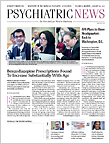Academic psychiatry is facing many pressures. It is true that many of these impact all of psychiatric practice—such as poor reimbursement, intrusive utilization review, and a lack of understanding of the severity of psychiatric illness—but when combined with an uncertain future for graduate medical education and research funding, they make the position of academic departments of psychiatry, never robust, more precarious.
These forces may seem distant as we have been, in many ways, in a golden era of academic psychiatry. From the 1960s to the present, we have seen a dramatic growth in residency training slots in psychiatry and research on fundamental neurobiologic processes and the genetics underlying psychiatric disorders. In addition, psychiatrists have assumed leadership roles as chief executives of academic medical centers and deans of medical schools.
Despite these accomplishments, psychiatry departments are particularly dependent upon funding from enlightened state departments of mental health, the Veterans Administration, and other public as well as private sources of research funding. The profitability of psychiatric care at either the physician or hospital level is far less than that for other medical specialties, particularly surgical or interventional medical specialties.
These financial pressures—which are similar to those that affect psychiatrists in private practice and public institutions—are intensifying due to a confluence of factors. First, while the Affordable Care Act has expanded access to health care, newly insured patients are often covered by Medicaid or exchange plans that reimburse all care, including psychiatric, at relatively low rates. This is additive to the already large role that Medicaid plays in the provision of psychiatric services.
Second, this shift to Medicaid limits the role of state departments of mental health—many of which have had important relationships with academic psychiatry departments since the late 19th century.
Third, the management of state-based Medicaid programs has increasingly been carved out to behavioral health managed care companies. This creates several problems for psychiatry in general and academic departments in particular. For one, the benefits of integrated care are more difficult to show in models that don’t account for the full general medical costs of health care, which are known to be higher for patients with psychiatric illness. Also, the consolidation of academic medical centers into large health care systems, which has occurred nationally in part to balance the power of insurers, has been less beneficial for psychiatry than for medical and surgical services. As such, while greater access to care is certainly better for patients, it may not improve the marginal value of psychiatric services to academic health centers and may inadvertently undermine the strength of some traditional allies for academic departments such as state departments of mental health.
Given these long-term and increasingly difficult challenges, how have psychiatry departments been able to manage and thrive? In significant part, it has been due to their important research base in clinical, translational, and basic science research and their core role in medical education, including graduate medical education. Psychiatry departments in U.S. medical schools rank second among all medical school clinical departments in their level of federal research funding.
Of these many issues, the research environment is perhaps the most challenged, paradoxically at a time of extraordinary opportunity in genetics, neuroscience, and translational research. Aggregate NIH funding in real-dollar terms peaked in 2004. Leaving aside the substantive discussions of precisely where research funding in psychiatry should be targeted, the decline in NIH funding patterns is challenging to the careers of both younger and established investigators.
Also, many in the pharmaceutical and biotechnology industries have shifted from clinical neuroscience research to lower-risk areas with more well-developed genetic targets such as oncology. The net result is that clinical research in departments of psychiatry is systemically challenged. The greatest impact of this change in industry funding is, of course, on patients and families. We are deeply in need of new pharmacotherapies and neurotherapeutics based on specific genetic and neuroscience processes. Highly specific treatments, as the physician and noted author Lewis Thomas reminded us, are not only more effective but generally less toxic. These changes in industry funding, when paired with reductions in the true dollar amount of NIH funding, impact the success and potentially the longer-term viability of academic psychiatry departments. All of this is challenging for the field at what should be a time of enormous promise.
APA has a critical role as a convener of the field and in advocacy. It was APA, along with NIMH and academic psychiatry leadership in the latter part of the last century, that helped the field to develop to its current prominence. It is incumbent upon us to focus our attention on these issues so that our academic departments remain strong enough to allow care, new treatments, and education to move forward effectively at a time when our services have never been more essential or the potential for fundamental breakthroughs greater. ■

